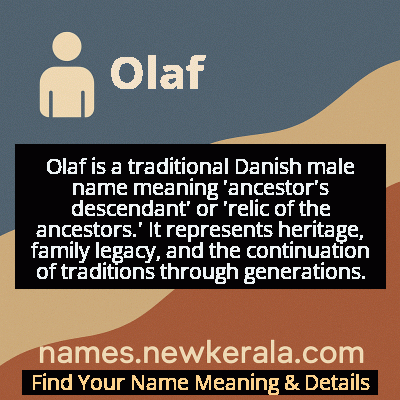Olaf Name Meaning & Details
Origin, Popularity, Numerology Analysis & Name Meaning of Olaf
Discover the origin, meaning, and cultural significance of the name OLAF. Delve into its historical roots and explore the lasting impact it has had on communities and traditions.
Name
Olaf
Gender
Male
Origin
Danish
Lucky Number
7
Meaning of the Name - Olaf
Olaf is a traditional Danish male name meaning 'ancestor's descendant' or 'relic of the ancestors.' It represents heritage, family legacy, and the continuation of traditions through generations.
Olaf - Complete Numerology Analysis
Your Numerology Number
Based on Pythagorean Numerology System
Ruling Planet
Neptune (Ketu)
Positive Nature
Intuitive, analytical, spiritual, and inquisitive.
Negative Traits
Secretive, reserved, aloof, and can be overly critical.
Lucky Colours
Green, yellow.
Lucky Days
Monday.
Lucky Stones
Cat’s eye, moonstone.
Harmony Numbers
1, 5, 6.
Best Suited Professions
Scientists, researchers, spiritual leaders, detectives.
What People Like About You
Depth of knowledge, analytical skills, spirituality.
Famous People Named Olaf
Olaf II Haraldsson
King and Saint
Christianized Norway and became the country's patron saint
Olaf Tryggvason
King
Played crucial role in Norway's conversion to Christianity
Olaf Stapledon
Writer and Philosopher
Influential science fiction writer known for 'Star Maker'
Olafur Eliasson
Artist
Renowned for large-scale installation and environmental art
Name Variations & International Equivalents
Click on blue names to explore their detailed meanings. Gray names with will be available soon.
Cultural & Historical Significance
During the Viking Age and medieval period, Olaf represented the transition from pagan Norse traditions to Christianity, embodying both warrior strength and religious devotion. The name's association with multiple Norwegian kings cemented its status as a royal name, while its saintly connections gave it religious significance. Throughout Scandinavian history, Olaf has been a name that conveys deep cultural roots, national identity, and the preservation of heritage. Its continued use reflects the enduring importance of historical connections and traditional values in Scandinavian societies.
Extended Personality Analysis
Individuals named Olaf are typically perceived as strong, reliable, and deeply connected to their heritage and family traditions. They often exhibit qualities of steadfastness and determination, reflecting the name's royal and saintly historical associations. Olafs are frequently seen as traditionalists who value history, cultural roots, and stability, often serving as pillars in their communities or families.
Their personality combines practical wisdom with a quiet, resilient strength, making them natural leaders who prefer to lead by example rather than through overt charisma. While they may appear reserved or serious initially, Olafs possess deep loyalty to those they care about and demonstrate remarkable endurance in facing life's challenges. This combination of traditional values, reliability, and inner fortitude makes them respected figures who others often turn to for guidance and support in both personal and professional contexts.
Modern Usage & Popularity
In contemporary naming practices, Olaf maintains steady popularity in its native Scandinavian countries, particularly in Norway and Denmark, where it ranks among traditional favorite names. The name experienced a noticeable resurgence following the success of Disney's Frozen franchise, though it remains more popular in its native regions than internationally. In Denmark specifically, Olaf is considered a classic, respectable name that conveys heritage and stability without being overly common. Modern usage often pairs it with more contemporary middle names to balance tradition with modernity, and it's frequently chosen by parents who value Scandinavian heritage and strong historical connections. While younger urban generations might perceive it as somewhat old-fashioned, the name continues to maintain cultural relevance and adapt to modern naming trends through creative combinations and international exposure.
Symbolic & Spiritual Meanings
Symbolically, Olaf represents ancestral connection, heritage preservation, and the bridge between tradition and progress. The name carries deep connotations of steadfastness and reliability, much like the enduring Scandinavian landscapes from which it originates. It symbolizes the preservation of cultural identity and family legacy, serving as a living connection to historical roots and traditions that have withstood the test of time. Metaphorically, Olaf embodies the concept of 'strength through heritage' - drawing power and wisdom from ancestral knowledge while navigating contemporary challenges. The name also represents the delicate balance between warrior spirit and peaceful leadership, reflecting its historical bearers who were both military commanders and nation-builders. In a broader sense, Olaf symbolizes the importance of remembering one's origins while progressing forward, making it a name that honors the past while embracing the future with resilience and purpose.

